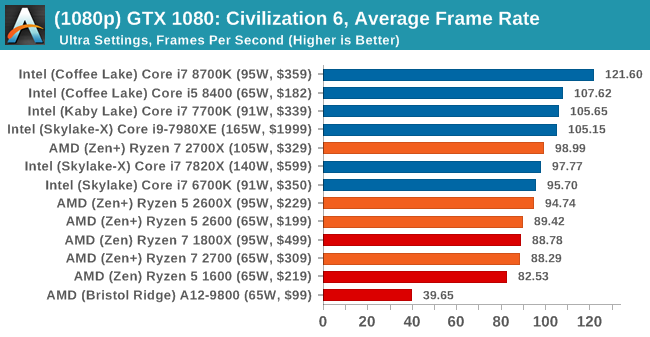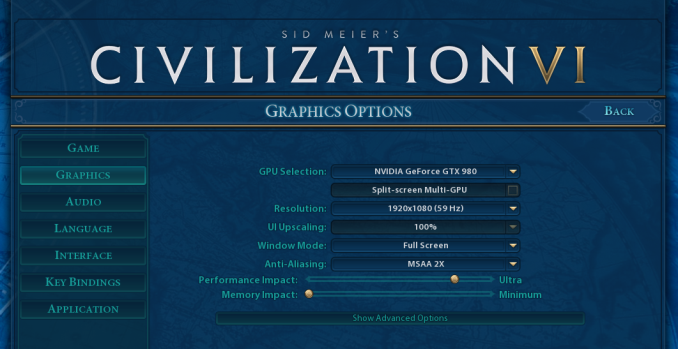The AMD 2nd Gen Ryzen Deep Dive: The 2700X, 2700, 2600X, and 2600 Tested
by Ian Cutress on April 19, 2018 9:00 AM ESTCivilization 6
First up in our CPU gaming tests is Civilization 6. Originally penned by Sid Meier and his team, the Civ series of turn-based strategy games are a cult classic, and many an excuse for an all-nighter trying to get Gandhi to declare war on you due to an integer overflow. Truth be told I never actually played the first version, but every edition from the second to the sixth, including the fourth as voiced by the late Leonard Nimoy, it a game that is easy to pick up, but hard to master.
Benchmarking Civilization has always been somewhat of an oxymoron – for a turn based strategy game, the frame rate is not necessarily the important thing here and even in the right mood, something as low as 5 frames per second can be enough. With Civilization 6 however, Firaxis went hardcore on visual fidelity, trying to pull you into the game. As a result, Civilization can taxing on graphics and CPUs as we crank up the details, especially in DirectX 12.
Perhaps a more poignant benchmark would be during the late game, when in the older versions of Civilization it could take 20 minutes to cycle around the AI players before the human regained control. The new version of Civilization has an integrated ‘AI Benchmark’, although it is not currently part of our benchmark portfolio yet, due to technical reasons which we are trying to solve. Instead, we run the graphics test, which provides an example of a mid-game setup at our settings.
At both 1920x1080 and 4K resolutions, we run the same settings. Civilization 6 has sliders for MSAA, Performance Impact and Memory Impact. The latter two refer to detail and texture size respectively, and are rated between 0 (lowest) to 5 (extreme). We run our Civ6 benchmark in position four for performance (ultra) and 0 on memory, with MSAA set to 2x.
For reviews where we include 8K and 16K benchmarks (Civ6 allows us to benchmark extreme resolutions on any monitor) on our GTX 1080, we run the 8K tests similar to the 4K tests, but the 16K tests are set to the lowest option for Performance.
All of our benchmark results can also be found in our benchmark engine, Bench.
MSI GTX 1080 Gaming 8G Performance
1080p



4K



8K



16K
















545 Comments
View All Comments
Maxiking - Tuesday, April 24, 2018 - link
"I just finished running Rise of the Tomb Raider benchmarks, 1080p, very high preset, FXAA.Unpatched:
Mountain Peak: 131.48 FPS (min: 81.19 max: 197.02)
Syria: 101.99 FPS (min: 62.73, max: 122.24)
Geothermal Valley: 98.93 FPS (min:76.48, max: 117.00)
Overall score: 111.31 FPS
Windows patch only:
Mountain Peak: 135.34 FPS (min: 38.21 max: 212.84)
Syria: 102.54 FPS (min: 44.22, max: 144.03)
Geothermal Valley: 96.36 FPS (min:41.35, max: 148.46)
Overall score: 111.93 FPS
Windows patch and BIOS update:
Mountain Peak: 134.01 FPS (min: 59.91 max: 216.16)
Syria: 101.68 FPS (min: 38.95, max: 143.44)
Geothermal Valley: 97.55 FPS (min:46.18, max: 143.97)
Overall score: 111.62 FPS
Average framerates don't seem affected."
From the link you posted, you got rekt by yourself.
Ranger1065 - Wednesday, April 25, 2018 - link
Nicely done Mr Aardvark. That made me smile.mikael.skytter - Tuesday, April 24, 2018 - link
Thanks for a great review. Any chance it would be possible to look into how SpeedShift 2 compares to AMD:s solution for short burst loads and clock ramp-up?Thanks!
koekkoe - Tuesday, April 24, 2018 - link
My favorite part in the article: fsfasd.Meow.au - Tuesday, April 24, 2018 - link
I’ve visited the comments section a few times since the publication. As a psychologist in training, I’ve found it interesting as the initial complaints about this review were reasonable (it doesn’t match other sites), but by page 45 are now bordering on paranoia and conspiracy theories. The conspiracy theories are all the more puzzling when the simplest and most reasonable explanation is that the spectre patch has punished Intel processors rather severely. I’ve found trying to argue against conspiracy theories, be it the moon landing or anti-vaxers, to be singularly ineffective.The more you provide scientific evidence and rationality, the harder conspiracy theorists dig in their heels and defend their original position. Our natural confirmatory bias to only seek evidence which confirms pre-existing beliefs seems to be a flaw built into the wiring of the human brain. Psychologically protective? Yes... it’s nice to always be right. Useful for doing science? No.
I’d be delighted (and shocked) in a week’s time to learn of massive incompetence or a cover up. I expect there to be some interesting and unexpected details. But I’m guessing no evidence will be found for the commonly repeated conspiracy theories (spectre effect is minimal, heatsink throttling, bias against intel, etc.). But I guess that will just be further evidence there really is a conspiracy... whatever.
Keep up the good work guys. A long time reader.
RafaelHerschel - Wednesday, April 25, 2018 - link
I think you need more training, psychologist in training, because it seems that you can't detect your own personal bias. As you stated yourself, the original complaints are quite reasonable. The problem is that AnandTech is not addressing these complaints in a timely manner and is mostly interested in damage control.The fact that some complaints are unreasonable doesn't change the fact.
Many other reviewers have applied all relevant patches, it is poor form to assume that they haven't. But I understand why you question their competence or integrity. It's cognitive dissonance. You trust AnandTech. In this case AnandTech is an outlier and has not clarified the unique results of their gaming test. Your trust in AnandTech is therefore not logical, and yet you consider yourself a logical person.
Therefore, you have decided that the 'logical' explanation is that all other reviewers haven't applied the patches... whatever.
divertedpanda - Wednesday, April 25, 2018 - link
Other reviewers admitted having not patched down to the bios since some used mobos where patches were not yet released.TrackSmart - Thursday, April 26, 2018 - link
This comment by RafaelHerschel doesn't make sense. The person being maligned said exactly this: "I expect there to be some interesting and unexpected details. But I’m guessing no evidence will be found for the commonly repeated conspiracy theories..."And he/she was EXACTLY CORRECT in that prediction.
Your complaint, on the other hand, seems disingenuous. Anandtech's staff immediately flagged their gaming results as anomalous (on just about every page of the article). Then they dug deep to figure out what happened, which takes time to test, confirm, and then publish about). Then about 5 days later they posted updated results (2700x and i7-8700k, so far) and a VERY DETAILED explanation of what happened.
So.... What's the problem again? That sometimes unforeseen test parameters can lead to different results? That can happen. The only question is how was the situation handled. In this case, I think reasonably well under the circumstances.
mapesdhs - Monday, May 14, 2018 - link
Grud knows now what "timely manner" is supposed to mean these days. Perhaps RafaelHerschel would only be happy if AT can go back in time and change the article before it's published.Meow.au, re what you said, Stefan Molyneux has some great pieces on these issues on YT.
schlock - Tuesday, April 24, 2018 - link
Why aren't we running DDR4-3200 across all systems? It may go a small ways to explaining the small discrepancy in intel performance ...